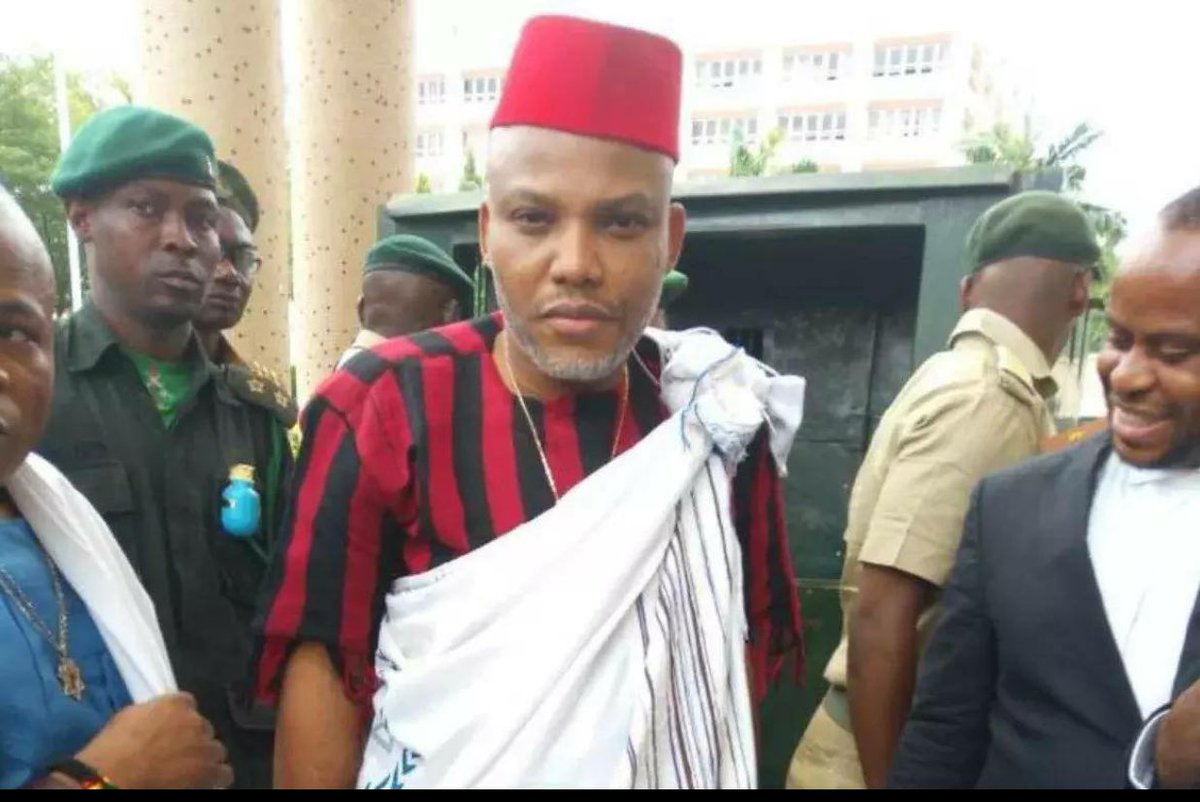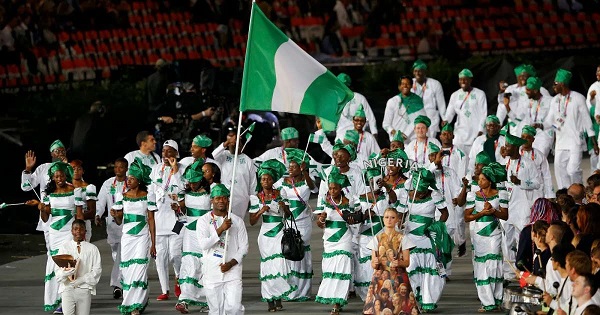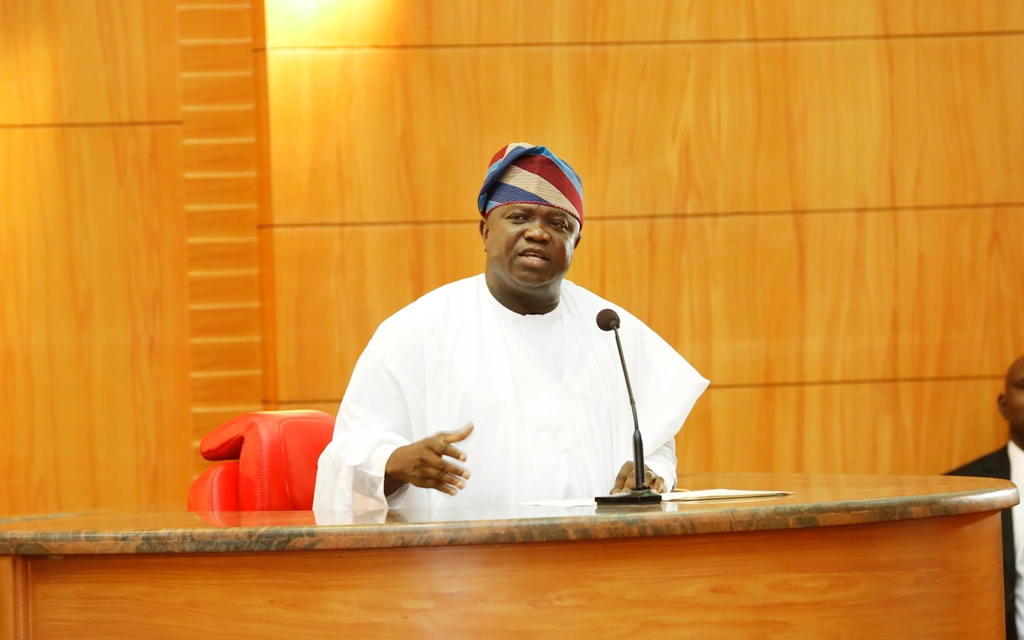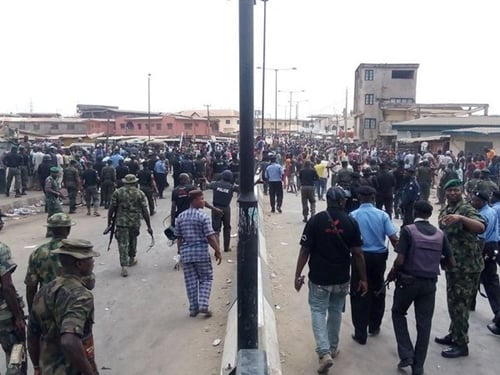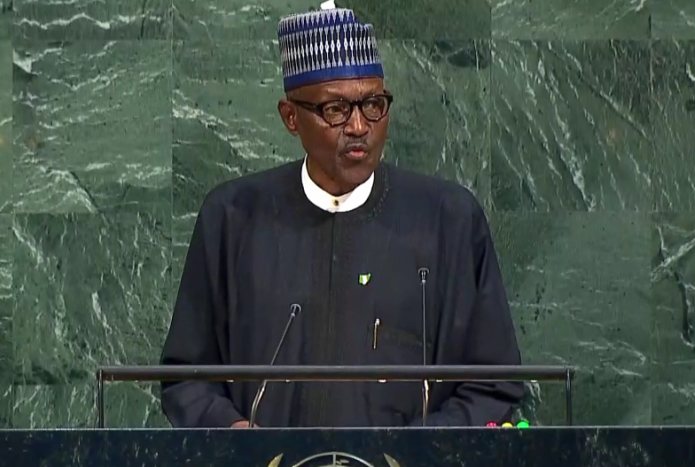Even though the Nigerian military, like the military all over the world, is used to christening its strike operations scary cognomens, finding out what informed its latest operations in the South East which it codenamed Operation Python Dance may open a vista into what the military thinks of us as a people. Or what it thinks of the latest victim of its operation, the Igbo ethnic stock.
Why python? Is the python known to dance at all? Why would an anaconda, a gigantic snake whose major feature of operation is to crush its large animal preys by coiling round them and then crushing their bones with a baffling precision, be the most befitting name that General Tukur Yusuf Buratai and his lieutenants would choose to describe an operation in a region where there is no love lost between its Commander-in-Chief, General Muhammadu Buhari and the Igbo?
Like the python’s extremely likeable and beautiful skin, the Nigerian army wears a snake-green uniform that you cannot but fall in love with. But beyond this, pythons are constrictors. When the python places its eyes on a prey, it is merciless and coldblooded. Once the prey is by its reach, the python twines itself round it and peremptorily squeezes life out of it. It continues the process of coiling itself round the prey and the victim’s breath diminishes with each breath the anaconda takes while its victims is under its squeeze. This continues down till the time the victim ceases to breathe completely. The moment the python discovers that its prey had breathed its last, it begins to swallow it piecemeal. Like the military, which seldom goes on operations, the python, according to herpetology – the study of snakes – may only need to eat four times a year. On the dance, perhaps the military approximates the serpentine coil of the anancoda to the sorrow, tears and blood it is provoking at the moment in Aba while it is in pursuit of Nnamdi Kanu, self-styled leader of the Independent People of Biafra (IPOB)?
When the military announced the Operation Python Dance, it claimed it was worried by the persistent spate of kidnaps, robberies and allied crimes in the east. Thus, immediately the operation began, it came with an intensity of patrols, road blocks, raids and other activities which it claimed were targeted at miscreants and criminal elements. In its claim, the operation also targeted intra and inter communal crisis, farmer-herdsmen clashes, kidnapping, armed robbery and cultism, as well as trading in human beings in the region.
Advertisement
Anyone who bothers to analyze the modus operandi of the military would know that the outlined aims of Operation Python Dance were a mere façade. Its major target was the irreverent animal which the python coveted its flesh, Kanu. This is because, if the outlined crimes were its target, they are all over Nigeria. In the last two years or thereabout, Kanu has demonstrated an avant-garde potential which must bother any government. He has spat several times on the graves of the founding fathers of Nigeria in the most incandescent language, maintains a rag-tag army and spits an acidic poison of hate against every other tribe but his Igbo ethnic stock. Indeed, Kanu has threatened the existence of the Nigerian state with his vitriolic spits.
Tell you the truth, listening to some of Kanu’s irreverent statements, this writer came to the conclusion that his mental state was questionable. Added to his weird sartorial choice, claim of ancestral linkage to a Jewish origin, his queer mannerism, the writer concluded that his vituperations indexed early symptoms of imbalance. But, many fighters of causes like Kanu’s Biafra have always presented same weirdness. Argentine Marxist revolutionary, Ernesto “Che” G
To be candid, any tribe or region that is a victim of the wonky governmental structure Nigeria has found itself practicing since the unitarist federalism promulgated by military fiat of 1966 would be driven to this naughty and nutty state that Kanu and his disciples are today. In education, governance, fiscal federalism and virtually all the ingredients that solder nations together, some regions are put down by this iniquitous system since 1966, while the favoured other gains upper hand from the ‘feeding bottle federalism.’ It is on record that since the collapse of the First Republic, virtually all the ingredients of a country moving towards nationhood have collapsed in Nigeria and the country has since then been tottering by the precipice. An iniquitous governmental structure which guarantees some region ascendancy over the others has fertilized mutual animosities and hatreds among Nigerians. This is why no one can seriously blame the weirdo called Nnamdi Kanu. While many ventilate their frustration with Nigeria by deploying logic in discussions and writings, the irreverent youth does so with bombastic vituperations.
Advertisement
Irrespective of this structural imbalance, Nigeria soldered on since 1966, papering over the cracks of its false nationhood. With the beheading of Akaluka, the Igbo man in Kano in the 80s, it became very clear to the rest of Nigeria that the nations that make up Nigeria are miles apart in their belief systems, philosophies, cultures and what the Germans call Volksgeist, a necessary condition for unity. Volksgeist is a German loanword that literally translates to mean “spirit of the people” or “national character.” It is a common “spirit” that is a collective possession by the people in a country. Can anyone identify what is the common spirit among the people of Nigeria? Rather, there are common spirits among the Igbo, Hausa and Yoruba, not to talk of the ones among over 200 ethnic nations that make up the country. It was this lack of a common spirit which brought nationalists of pre-colonial Nigeria to remark that Nigeria is a mere geographical expression and lacks the common consciousness that the Welsh, the English have. In countries that lack such common spirits, the system of government that caters for their multiple indices of nationhood is federalism, where each of the nations develop at its own pace. When recently Vice President Yemi Osinbajo literally insulted his grand father-in-law, Chief Obafemi Awolowo by referencing Italy as a geographical expression which is still together, his analogy reeked of a comparative typology that is amiss. To equate the Nigerian situation with the Italian model when every federalist knows that no two federalist states are the same, sounded like an intellectual insensitivity.
Eminent Nigerians across the political and ethnic divides of Nigeria are leading advocates of a restructuring of Nigeria. Federalism scholars have posited, time and time again, that a system of government that can actively attend to the plural nature of a country like Nigeria with multifarious tribes, religions, cultures, languages is federalism. Indeed, their studies of Nigeria have indicated that the country was merely soldered together forcefully by British imperialists, regardless of its plural nature. It is evident that the many agitations against the unity of Nigeria and hurtful attempts to decree unity without taking into consideration that the nations in Nigeria are wide apart, are what stoke the embers of division in the country.
A true practice of federalism would ensure that regions or states develop at their own pace and would not have to depend on the dole-outs from the centre on a monthly basis. The absence of this practice in Nigeria has ensured the deepening of indolence and iniquitous relationships among the states of the country. How can anybody fathom that a country like Nigeria with its wealth of natural resources like gold, tin, diamond, iron ore and many others is so boxed to a corner that it is solely dependent on fossil fuel which right-thinking nations are looking ahead of?
It must be said that no government in the history of Nigeria since post-civil war has witnessed as much divisive discourses as the current government. The fissiparous tendencies have been on the rise in the form of IPOB’s advocacy for a state of its own, with other nations calling for self-actualization without caring whose ox is gored. The calls went so bad that a northern group issued an ultimatum to Igbo in the North to quit the region by October 1, 2017. Indeed, since the Sani Abacha misrule sparked off Ken Saro-Wiwa who used literature to disown the iniquitous federal makeup which denied Ogonis their natural endowments, following in the footsteps of Adaka Boro, no government had sired as much hate as the Buhari government. The question to ask is, why are these divisive tendencies this multiple now?
Advertisement
President Buhari has sowed the seeds of so much hate among the plural ethnic groups in Nigeria, especially against the Igbo. He gives a paternal cuddling of his Northern region and gives a thorn-laced embrace of others. Recently, even though there is no oil well anywhere in Northern Nigeria, while four out of the five states in Igboland have proven oil resources, his government made some appointments to the board of the Nigerian National Petroleum Corporation (NNPC).Out of the 15 appointees to the board, 10 hailed from the Northern part of the country and were mostly Hausa Fulani; three from the South West and two from the South-South and none from among the Igbo. The President-General of Ohanaeze, Chief John Nwodo, perhaps put the perceived hatred of Buhari for the Igbo in the greatest perspective, which he called “brazen disregard, marginalization and non-compliance with the Federal Character provisions.” President Buhari, since inauguration, has lived with the tone and tenor of the volatile comment he made during his maiden travel to the United States of America. When asked if he would run an inclusive government, he had replied that since the Igbo nation gave him a paucity of votes, it could not expect to reap equal benefits with other nations which gave him 97% votes. It is such unstatesmanly favouritism that gave birth to the irreverence of Kanu.
Having said this however, Nnamdi Kanu hits his feet against the stone by seeking to excise his Igbo nation out of Nigeria. The Igbo nation is as divided as any other nation in Nigeria. This writer is a beneficiary of the accommodating nature of an Igbo man and lived four of the best years of his life in Enugu. He is aware that the Wawa people, for instance, are denigrated in the greater Igbo geographical and cosmological makeup. The Ebonyi people are even worse in the estimation of the other Igbo. The Igbo are about the greatest entrepreneurs in Nigeria at the moment and will thrive only in a wider Nigeria. Any attempt to circumscribe them in a straitjacket ethnic cocoon will boomerang. The youth should have joined the Ndubuisi Kanus who seek to use the Biafran ideology to canvass a true practice of federalism in Nigeria and not a breakup of Nigeria.
The appropriateness of deploying the army on this civil assignment has been debated severally. Eminent lawyer, Femi Falana, has brilliantly bayoneted it as needless. I agree. The Operation Python Dance is inconsistent with the democratic government that we ape. The military is trained to combat external enemies while the police is trained to fight civil infractions and their architects. There is no way a people trained to fight enemies would be deployed to fight their own brothers and they will not see them as enemies. No wonder the hordes of atrocities said to have been committed in Abia.
The way to arrest IPOB and other separatist groups is for us to have a true federal practice or an equitable distribution of amenities and appointments by government to the regions. At that moment, Kanu’s irreverence and that of his divisive ilk will die a natural death.
Advertisement
Between IGP and Misau
A ding-dong has been playing out between the Inspector General of Police, (IGP) Ibrahim Idris and the Chairman, Senate committee on Navy, Senator Hamman Isah Misau. Coming on the heels of allegation from the Senator that the IGP diverts about N10 billion Internally Generated Revenue of the police monthly and that he collects billions of naira bribe from individuals and companies to whom he makes available the services of policemen under him as guards and orderlies, the police swiftly claimed that Misau, an erstwhile officer of its whom it transferred to Niger State, deserted and never resigned from the force before joining politics. The Police Service Commission put a lie to this. The police is, however, still sticking to its guns.
It is difficult at this point to hanker a guess on where the pendulum of complicity is tilting towards but one thing is evident: The police would never have brought out the issue of Misau’s alleged desertion if he had not chosen to wash Idris’ allegedly dirty linen in the public. Only a fool does not know that the Nigeria Police is a sewer of maggots, like many other institutions in Nigeria. Now that we know that Misau is not a deserter, his allegations should never be allowed to be swept under the rugs. An independent enquiry of neither the police nor the EFCC should spell out the colour of the stench oozing out from the epaulettes of the IGP.
Advertisement
Time to clone Fayose
As if gold is the graze that their herds devour at the Ilado, Akure, Ondo State Farm of former Secretary to the Government of the Federation, Chief Olu Falae, the farm has become a place to plunder by highly vilified Fulani herdsmen whose nuisance has become ceaseless objects of discourse in Nigeria. In August, some suspected herdsmen had laid siege to the farm, destroying crops said to be worth millions of naira. Not long after, precisely this September, about 15 mobile policemen were said to have escaped death by the whiskers as herdsmen opened fire on them in Akure. Falae himself had earlier been kidnapped by these objectionable characters and at another time, one of his security men was killed. Also recently, a 72-year-old woman was gang-raped in the Odigbo area of the State and the hoodlums are yet to be brought to book.
This persistent violence calls for a firm governmental decision in Ondo State. It may not be a bad idea, in the spirit of integration, to borrow a leaf from the example of nearby Governor Ayodele Fayose of Ekiti. With the criminalization of borderless grazing in Ekiti State, criminal wolves in sheep’s clothing have fled the state. The only problem, I reckon, is that the deafening silence from the Aso Villa may be conceived by states like Ondo as indication that taking action against these criminals may rupture their patrimony from the federal patron.
Advertisement
Views expressed by contributors are strictly personal and not of TheCable.
Add a comment

